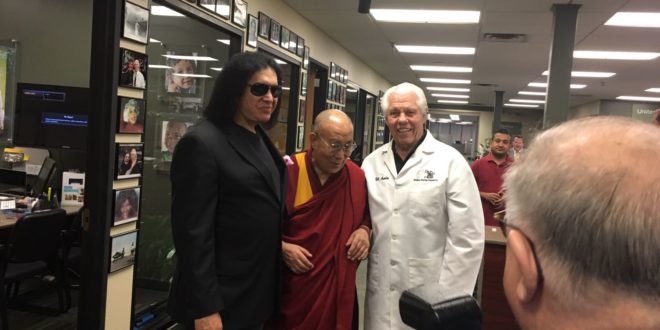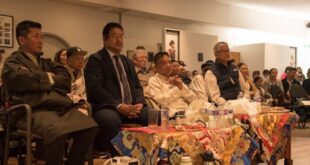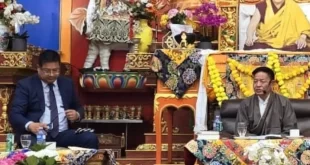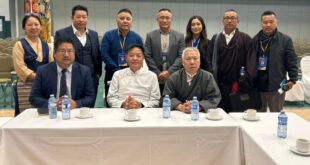S. RES. 429
Agreed to Senate (04/25/2018)
|
115th CONGRESS
2d Session |
Commemorating the 59th anniversary of Tibet’s 1959 uprising as “Tibetan Rights Day”, and expressing support for the human rights and religious freedom of the Tibetan people and the Tibetan Buddhist faith community.
Mr. Leahy (for himself, Mrs. Feinstein, Mr. Cruz, and Mr. Rubio) submitted the following resolution; which was referred to the Committee on Foreign Relations
Reported by Mr. Corker, without amendment
Considered and agreed to
Commemorating the 59th anniversary of Tibet’s 1959 uprising as “Tibetan Rights Day”, and expressing support for the human rights and religious freedom of the Tibetan people and the Tibetan Buddhist faith community.
Whereas March 10, 2018, marks the 59th anniversary of the 1959 uprising in Tibet, during which the people of Lhasa, fearing for the life of the Dalai Lama, surrounded his residence, organized a guard, and called for the withdrawal of Chinese forces from Tibet and the restoration of Tibet’s freedom;
Whereas Chinese statistics estimate 87,000 Tibetans were killed, arrested, or deported to labor camps during the suppression of the 1959 uprising, which also forced the Dalai Lama and tens of thousands of other Tibetans to flee into exile;
Whereas March 10, 2018, also marks the 10th anniversary of a series of protests in Lhasa, which spread across Tibet, and which were suppressed by Chinese forces;
Whereas, according to the Department of State, the Government of the People’s Republic of China is engaged in the severe repression of Tibet’s unique religious, cultural, and linguistic heritage, and is engaged in gross violations of human rights in Tibet, including extrajudicial detentions, disappearances, and torture;
Whereas, in the 10 years since the 2008 protests, at least 152 Tibetans in Tibet are known to have self-immolated, with statements or records left by these self-immolators calling for freedom for Tibet and the return of the Dalai Lama;
Whereas, in 1961, with the support of the United States, the United Nations General Assembly recognized the Tibetan people’s “fundamental human rights and freedoms, including the right to self-determination”;
Whereas, on October 18, 2007, Congress awarded the Congressional Gold Medal to the Dalai Lama, finding that he is recognized around the world as a leading figure of moral and religious authority, and is the unrivaled spiritual and cultural leader of the Tibetan people;
Whereas Buddhists in Tibet, the United States, India, Nepal, Bhutan, Mongolia, Russia, and other countries where followers of Tibetan Buddhism reside look to the Dalai Lama for religious leadership and spiritual guidance;
Whereas, in its 2017 annual report, the United States Commission on International Religious Freedom noted that “[t]he Chinese government claims the power to select the next Dalai Lama with the help of a law that grants the government authority over reincarnations,” which purports to require all Tibetan Buddhist leaders to obtain the approval of the Government of the People’s Republic of China in order to reincarnate;
Whereas the Government of the People’s Republic of China has interfered in the identification and installation of reincarnated leaders of Tibetan Buddhism, as part of its efforts to maintain control over Tibet, including in 1995 arbitrarily detaining the recently identified 11th Panchen Lama, then a 6-year-old boy, and purporting to install China’s own candidate as Panchen Lama;
Whereas, in 2011, the 14th Dalai Lama declared that the responsibility for identifying a future 15th Dalai Lama will rest with officials of the Dalai Lama’s private office and that “apart from the reincarnation recognized through such legitimate methods, no recognition or acceptance should be given to a candidate chosen for political ends by anyone, including those in the People’s Republic of China”;
Whereas, in 1981, the United Nations General Assembly passed the Declaration on the Elimination of all Forms of Intolerance and of Discrimination Based on Religion or Belief, which provides that freedom of religion shall include the freedom to “train, appoint, elect or designate by succession appropriate leaders called for by the requirements and standards of any religion or belief”; and
Whereas Congress has long held that the right to freedom of religion undergirds the very origin and existence of the United States, and that freedom of religious belief and practice is a universal human right and fundamental freedom: Now, therefore, be it
(1) recognizes March 10, 2018, as “Tibetan Rights Day”;
(2) affirms its recognition of His Holiness the 14th Dalai Lama for his outstanding contributions to peace, nonviolence, human rights, and religious understanding;
(3) affirms its support for the Tibetan people’s fundamental human rights and freedoms, including their right to self-determination and the protection of their distinct religious, cultural, linguistic, and national identity;
(4) expresses its sense that the identification and installation of Tibetan Buddhist religious leaders, including a future 15th Dalai Lama, is a matter that should be determined solely within the Tibetan Buddhist faith community, in accordance with the inalienable right to religious freedom;
(5) expresses its sense that any attempt by the Government of the People’s Republic of China to identify or install its own candidate as a Tibetan Buddhist religious leader, including a future 15th Dalai Lama, is invalid interference in the right to religious freedom of Tibetan Buddhists around the world, including in Tibet as well as the United States and elsewhere; and
(6) calls on the Secretary of State to fully implement the provisions of the Tibetan Policy Act of 2002 (subtitle B of title VI of Public Law 107–228; 22 U.S.C. 6901 et seq.), in cooperation with like-minded states where appropriate, including that—
(A) representatives of the United States Government in exchanges with officials of the Government of the People’s Republic of China should call for and otherwise promote the cessation of all interference by the Government of the People’s Republic of China or the Chinese Communist Party in the religious affairs of the Tibetan people;
(B) the United States Ambassador to the People’s Republic of China should meet with the 11th Panchen Lama, who was arbitrarily detained on May 17, 1995, and otherwise ascertain information concerning his whereabouts and well-being; and
(C) the Secretary of State should make best efforts to establish an office in Lhasa, Tibet, to monitor political, economic, and cultural developments in Tibet.




